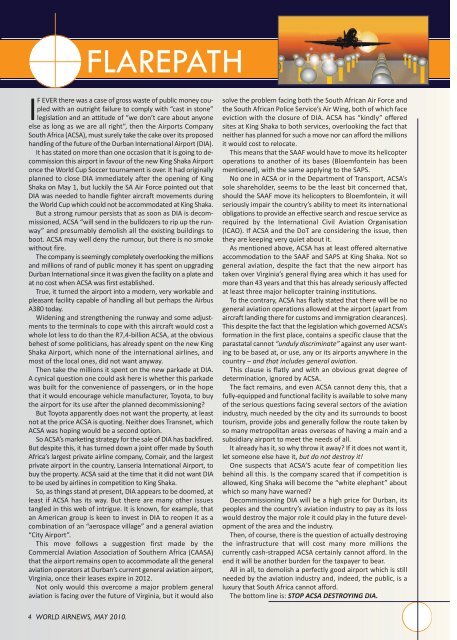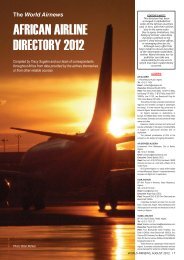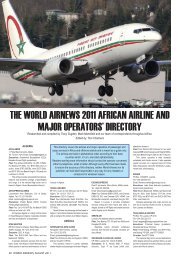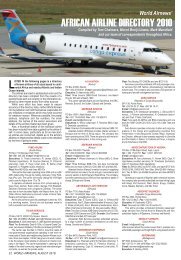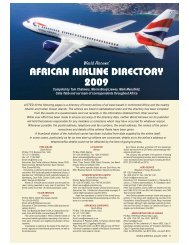May 2010 covers_Covers.qxd - World Airnews
May 2010 covers_Covers.qxd - World Airnews
May 2010 covers_Covers.qxd - World Airnews
Create successful ePaper yourself
Turn your PDF publications into a flip-book with our unique Google optimized e-Paper software.
IF EVER there was a case of gross waste of public money coupled<br />
with an outright failure to comply with “cast in stone”<br />
legislation and an attitude of “we don’t care about anyone<br />
else as long as we are all right”, then the Airports Company<br />
South Africa (ACSA), must surely take the cake over its proposed<br />
handling of the future of the Durban International Airport (DIA).<br />
It has stated on more than one occasion that it is going to decommission<br />
this airport in favour of the new King Shaka Airport<br />
once the <strong>World</strong> Cup Soccer tournament is over. It had originally<br />
planned to close DIA immediately after the opening of King<br />
Shaka on <strong>May</strong> 1, but luckily the SA Air Force pointed out that<br />
DIA was needed to handle fighter aircraft movements during<br />
the <strong>World</strong> Cup which could not be accommodated at King Shaka.<br />
But a strong rumour persists that as soon as DIA is decommissioned,<br />
ACSA “will send in the bulldozers to rip up the runway”<br />
and presumably demolish all the existing buildings to<br />
boot. ACSA may well deny the rumour, but there is no smoke<br />
without fire.<br />
The company is seemingly completely overlooking the millions<br />
and millions of rand of public money it has spent on upgrading<br />
Durban International since it was given the facility on a plate and<br />
at no cost when ACSA was first established.<br />
True, it turned the airport into a modern, very workable and<br />
pleasant facility capable of handling all but perhaps the Airbus<br />
A380 today.<br />
Widening and strengthening the runway and some adjustments<br />
to the terminals to cope with this aircraft would cost a<br />
whole lot less to do than the R7,4-billion ACSA, at the obvious<br />
behest of some politicians, has already spent on the new King<br />
Shaka Airport, which none of the international airlines, and<br />
most of the local ones, did not want anyway.<br />
Then take the millions it spent on the new parkade at DIA.<br />
A cynical question one could ask here is whether this parkade<br />
was built for the convenience of passengers, or in the hope<br />
that it would encourage vehicle manufacturer, Toyota, to buy<br />
the airport for its use after the planned decommissioning?<br />
But Toyota apparently does not want the property, at least<br />
not at the price ACSA is quoting. Neither does Transnet, which<br />
ACSA was hoping would be a second option.<br />
So ACSA’s marketing strategy for the sale of DIA has backfired.<br />
But despite this, it has turned down a joint offer made by South<br />
Africa’s largest private airline company, Comair, and the largest<br />
private airport in the country, Lanseria International Airport, to<br />
buy the property. ACSA said at the time that it did not want DIA<br />
to be used by airlines in competition to King Shaka.<br />
So, as things stand at present, DIA appears to be doomed, at<br />
least if ACSA has its way. But there are many other issues<br />
tangled in this web of intrigue. It is known, for example, that<br />
an American group is keen to invest in DIA to reopen it as a<br />
combination of an “aerospace village” and a general aviation<br />
“City Airport”.<br />
This move follows a suggestion first made by the<br />
Commercial Aviation Association of Southern Africa (CAASA)<br />
that the airport remains open to accommodate all the general<br />
aviation operators at Durban’s current general aviation airport,<br />
Virginia, once their leases expire in 2012.<br />
Not only would this overcome a major problem general<br />
aviation is facing over the future of Virginia, but it would also<br />
4 WORLD AIRNEWS, MAY <strong>2010</strong>.<br />
FLAREPATH<br />
solve the problem facing both the South African Air Force and<br />
the South African Police Service’s Air Wing, both of which face<br />
eviction with the closure of DIA. ACSA has “kindly” offered<br />
sites at King Shaka to both services, overlooking the fact that<br />
neither has planned for such a move nor can afford the millions<br />
it would cost to relocate.<br />
This means that the SAAF would have to move its helicopter<br />
operations to another of its bases (Bloemfontein has been<br />
mentioned), with the same applying to the SAPS.<br />
No one in ACSA or in the Department of Transport, ACSA’s<br />
sole shareholder, seems to be the least bit concerned that,<br />
should the SAAF move its helicopters to Bloemfontein, it will<br />
seriously impair the country’s ability to meet its international<br />
obligations to provide an effective search and rescue service as<br />
required by the International Civil Aviation Organisation<br />
(ICAO). If ACSA and the DoT are considering the issue, then<br />
they are keeping very quiet about it.<br />
As mentioned above, ACSA has at least offered alternative<br />
accommodation to the SAAF and SAPS at King Shaka. Not so<br />
general aviation, despite the fact that the new airport has<br />
taken over Virginia’s general flying area which it has used for<br />
more than 43 years and that this has already seriously affected<br />
at least three major helicopter training institutions.<br />
To the contrary, ACSA has flatly stated that there will be no<br />
general aviation operations allowed at the airport (apart from<br />
aircraft landing there for customs and immigration clearances).<br />
This despite the fact that the legislation which governed ACSA’s<br />
formation in the first place, contains a specific clause that the<br />
parastatal cannot “unduly discriminate” against any user wanting<br />
to be based at, or use, any or its airports anywhere in the<br />
country – and that includes general aviation.<br />
This clause is flatly and with an obvious great degree of<br />
determination, ignored by ACSA.<br />
The fact remains, and even ACSA cannot deny this, that a<br />
fully-equipped and functional facility is available to solve many<br />
of the serious questions facing several sectors of the aviation<br />
industry, much needed by the city and its surrounds to boost<br />
tourism, provide jobs and generally follow the route taken by<br />
so many metropolitan areas overseas of having a main and a<br />
subsidiary airport to meet the needs of all.<br />
It already has it, so why throw it away? If it does not want it,<br />
let someone else have it, but do not destroy it!<br />
One suspects that ACSA’S acute fear of competition lies<br />
behind all this. Is the company scared that if competition is<br />
allowed, King Shaka will become the “white elephant” about<br />
which so many have warned?<br />
Decommissioning DIA will be a high price for Durban, its<br />
peoples and the country’s aviation industry to pay as its loss<br />
would destroy the major role it could play in the future development<br />
of the area and the industry.<br />
Then, of course, there is the question of actually destroying<br />
the infrastructure that will cost many more millions the<br />
currently cash-strapped ACSA certainly cannot afford. In the<br />
end it will be another burden for the taxpayer to bear.<br />
All in all, to demolish a perfectly good airport which is still<br />
needed by the aviation industry and, indeed, the public, is a<br />
luxury that South Africa cannot afford.<br />
The bottom line is: STOP ACSA DESTROYING DIA.


